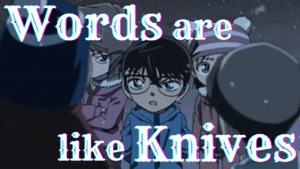Let’s learn Japanese with Danpei Tange’s quote from Tomorrow’s Joe (Ashita no Joe).
CONTENTS
Video
Danpei Tange’s Quote
Japanese: 立て!立つんだ、ジョー!
Romaji: tate! tatsunda, jō!
English: Stand up! Stand up, Joe!
Analysis
立て is the imperative form of 立つ meaning “to stand up”. So he is strongly commanding Joe to stand up as the Japanese imperative form sounds quite strong and forceful.
立つんだ is a combination of a verb dictionary form 立つ and んだ which is the broken version of のだ. A verb dictionary form followed by んだ or のだ can be used to give commands in a bit of an old-fashioned way. In English, it could be translated to “You WILL stand up!” which is not grammatically imperative but it expresses a strong command. It also sounds more encouraging and persuasive than the normal imperative form. When it’s used as a command, it sounds a bit dramatic and cheesy, so in a daily conversation you wouldn’t hear this so often, although it is often used in anime and dramas.
It can also be used to express your strong will when you want to encourage yourself.
Examples
Verb Dictionary Form + のだ/んだ (command)
早くこっちに来るんだ!
hayaku kocchi ni kuru nda!
Come here quickly!
知っていることを全部話すんだ!
shitteiru koto o zenbu hanasu nda!
Tell us everything you know!
爆発するぞ!ここから離れるんだ!
bakuhatsu suru zo! koko kara hanareru nda!
It’s going to explode! Get away from here!
Negative Commands: Verb dictionary form + んじゃない
こっちに来るんじゃない!
kocchi ni kuru njanai!
Don’t come here!
Verb Dictionary Form + のだ/んだ (strong will)
頑張って勉強して、試験に合格するんだ!
ganbatte benkyō shite, shiken ni gōkaku suru nda!
I will study hard and pass the exam!
東京に行って東京スカイツリーに登るんだ!
tōkyō ni itte tōkyō skai tsurī ni noboru nda!
I will go to Tokyo and go up the Tokyo Skytree!
今年こそ、彼女を作るんだ!
kotoshi koso kanojo o tsukuru nda!
I will definitely get a girlfriend this year!
Support Easy Peasy Japanesey
If you enjoy our content, please consider supporting Easy Peasy Japanesey. Your support will help keep us going. Thank you for your support!


